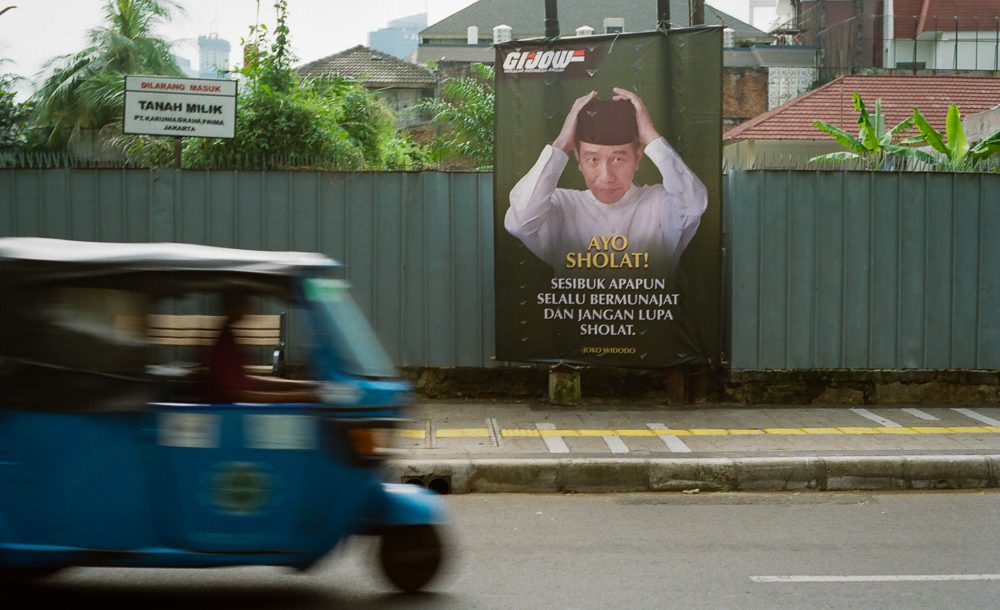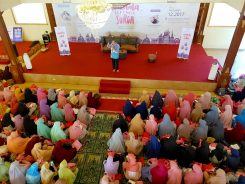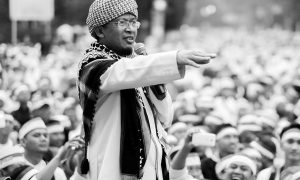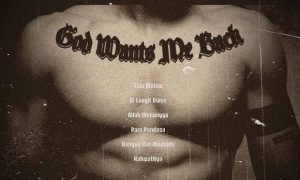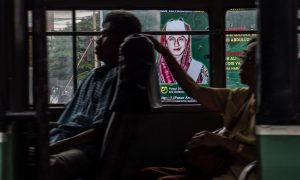Observers have noted the relative tranquillity that has characterised Indonesia’s election campaign this year. Indeed, the contest so far lacks the polarisation and bitterness that marked the presidential elections of 2014—let alone the 2017 gubernatorial elections in Jakarta, which gave birth to the “212” movement, named for the 2 December 2016 demonstration directed against the then governor of Jakarta, Basuki Tjahaja Purnama (popularly known as Ahok). In contrast to 2014 and 2016–17, this time it is much more difficult to sell one candidate as the sole champion of “Islam”, while portraying the other as his demonic antithesis.
Of course, there have been attempts to unleash similar waves of anxiety. But one can reasonably say, less than a fortnight before the elections, that they have largely failed. The Jokowi camp is obviously much more prepared than five years ago to counter the efforts of those who want their anti-Jokowi “news” to go viral. The Indonesian police seem to have stood firmly behind the president when it comes to detecting hoaxes directed against Jokowi and investigating those who try to spread them. Jokowi’s vice-presidential pick must be taken into account as well: it seems that the strategy to use Ma’ruf Amin (and other Islamic figures) as a bulwark against the reanimation of discourses that question Jokowi’s Islamic credentials was successful. And it also looks like that those who were disappointed that the Jokowi camp opted for this old conservative cleric-cum-politician—i.e. mainly young urban, liberal-minded Indonesians perhaps best represented by the new Indonesian Solidarity Party (PSI)—still stay with the president.
These defensive strategies have seen the anti-Jokowi scare campaign lose much of its steam throughout 2018–19, both in cyberspace and Indonesia’s public sphere at large. But as important as this development might be, one should not stop here with one’s analysis. In this short contribution, I want to argue that there are societal dynamics and shifts in Indonesia’s Islamic landscape at work, in which the gains of Jokowi-Amin (as projected by almost all polling institutes) are embedded. For the most part I leave political analysis—in the narrow, political science sense—aside (a task for which I, as an anthropologist, do feel not qualified anyway). Instead, I focus on these broader shifts and developments that remain far from irrelevant if one seeks to understand both Jokowi’s Islamic politics and the comfortable position he is in a few weeks before the elections.
The new marketplace for religious advice
Jokowi’s political career coincided with the rise of new Islamic figures that were not necessarily associated with the big players of Indonesia’s Islamic landscape such as Nahdlatul Ulama and Muhammadiyah. Utilising the media and, especially today, social media, these new influencers have become a force on their own—though a highly diversified one, consisting of preachers with different ideological backgrounds enjoying different levels of popularity, such as Ustadz Yusuf Mansur, Ustadz Arifin Ilham, Ustadz Abdul Somad Batubara, Ustadz Khalid Basalamah and many other preachers of similarly high or less prominent status.
The influence of these figures on politics has been varied. But when the most prominent of them unite—as was the case amid Jakarta’s gubernatorial election battle —they can help to mobilise huge crowds and make parts of the Muslim community, especially urban middle-class Muslims, susceptible to identity politics. In fact, players of Indonesia’s political field have realised long before the Jakarta election that the preachers can exert influence that can also serve their interests (and vice versa, one has to add). Well-known is, for example, the alliance of former president Susilo Bambang Yudhoyono with the celebrity preacher Aa Gym that (as James Bourk Hoesterey has skilfully analysed) came to a halt after the preacher married a second wife and lost most of his popularity.
In contrast to his predecessor, however, Jokowi—at least until very recently—never developed close relations with these preachers, nor was he able to become particularly popular among those Indonesians who largely constitute their followers—i.e. urban middle-class Muslims. This brings me to the shift which has occurred in Indonesia’s Islamic landscape, one which concerns not only the sheer growth of the Muslim middle class in the last decades but also their religiosity per se.
For many Indonesian middle-class Muslims, Islamic sociality—both offline and online—is important, and finds its expression in community-based activities such as Islamic study gatherings (majelis taklim) that are often organised by highly connected and social media-savvy middle-class women. Numerous such Islamic gatherings exist in urban Indonesia today and many of them are independent from Indonesia’s established Islamic organisations and Islamic political parties.
These gatherings are organised and informal at the same time, and they constitute the venues where the careers of Islamic preachers can begin and develop. Moreover, they are also often characterised by a certain ideological flexibility, since the preachers invited to such gatherings can have very different backgrounds. One and the same majelis can provide the stage for preachers ranging from Sufi mystics to Salafi hardliners (providing that the latter do not put a strong emphasis on the restriction of women’s roles in public life and on polygyny in their sermons).
What we can thus observe in Indonesia today is unprecedented in the country’s history: a growing Muslim middle class that is urban, relatively autonomous (in that it is independent from the structures and institutions by which Islam has been organised in Indonesia so far), difficult to categorise ideologically, and gendered in the sense that women play a greater role in organising religious life than before.
Concerning this last point, one should not forget that it is mainly women that decide who will be a successful preacher and who will not, which means that preachers have to adapt their sermons to middle-class women’s interests, desires and anxieties. The outcome of this is often a socially rather conservative brand of Islam, which at the same time—and this is often overlooked—is not a particularly dogmatic one, in the sense that one feels obliged to follow a particular Islamic school or current (as the “old” Muslim middle class has done in Indonesia, by being committed to Islamic reformism as represented by organisations such as Muhammadiyah or Persis).
What we can discern is that the approach to Islam has become more informal and embedded in a consumer culture in which Muslim women and men can—again, offline and online—shop for preachers and choose the advice that they find most useful. The preachers preach to an audience that is more interested in the pragmatics of solving everyday problems (an unfaithful husband; a rebellious teenage son or daughter) than in the politics of Indonesia’s office holders and their opponents.
Ambiguous relations
Yet this new class of preachers can still, under particular circumstances and especially before elections, exert influence on the political choices of their followers by appealing to religious sentiments. Over the last few years, and especially in the wake of the 2017 gubernatorial elections in Jakarta, Jokowi seems to have become aware of his limited popularity in urban Muslim middle-class circles, a segment of society closest to the preachers and from which the latter—one has to add—gain most of their income. Yet he has also realised that this is a problem he can work on, and he has acted accordingly by trying to court the pious middle class, by emphasising his piety and middle-class origin as well. From today’s perspective, it seems that his efforts were not in vain.
That this was possible, I argue, lies in exactly what I have discussed above: that is, in the dynamic religiosity of Indonesian middle-class Muslims. They like to follow different preachers of different ideological backgrounds, and today we have the situation that some of the preachers are with Jokowi and some of them are against him. Most importantly, some celebrity preachers who were so far in the anti-Jokowi and anti-Ahok camp at least do not publicly oppose Jokowi anymore (which brings us back to his running mate Ma’ruf Amin, who knows all these preachers very well). Today, the relationship between them and Jokowi might best be characterised as ambiguous, while it has lost its outright hostility (except for the smaller number of prominent preachers who actively take part in the anti-Jokowi campaign).
It has thus been difficult to create an atmosphere of extreme polarisation in which Muslims are made to believe that only voting for a particular candidate will ensure the very existence of their religion in Indonesia. Instead, the political landscape today resembles the actual religious landscape of Indonesia, in which Muslims have different Islamic options. In particular, the essentially heterogeneous realm of Indonesia’s Muslim middle class cannot easily be driven by dynamics that tend to concentrate this segment of society on the side of one candidate only.
One might argue against this reasoning by noting that the anti-Jokowi Islamic camp is still alive and well, given its ability to organise large demonstrations evident in the 212 “Reunion” rallies held in December 2017 and 2018. Yet these gatherings also revealed the obvious political interests of this movement, in the sense that it is borne now by Islamist organisations and political parties that are known to belong to the core of the anti-Jokowi opposition. It can hardly claim anymore that it represents Indonesia’s ummah (Muslim community) or that it has to “defend” Islam, although some of its members did exactly that. In other words, its base has narrowed and consists now of Muslims who are in one or the other way active in politics anyway, such as the hard-core followers of the Prosperous Justice Party (PKS) or the vigilantes of the Islamic Defenders Front (FPI).
Piety, politics, and the popularity of Felix Siauw
An ethnic Chinese convert to hardline Islam stands out in Indonesia’s crowded Islamic preaching market.
If Jokowi wins by a comfortable margin, as projected by most pollsters, any gain over his 2014 result will hardly be explainable without considering how Muslim middle-class religiosity works in Indonesia today: namely, that it rests on essentially unstable alliances between preachers and followers, consumerist orientations (which does not mean, however, that one should consider their religiosity as less “authentically Islamic” than the one of other Indonesian Muslims), and a piety that is conspicuous and pragmatic at the same time.
So far, these dynamics worked mainly to the disadvantage of Jokowi, but this cannot be convincingly argued anymore. Instead, taking a closer look at how middle-class Muslims practice their religion and the broader shifts of Indonesia’s Islamic landscape in which their religiosity is embedded might give us a clue as to why, shortly before election day, Jokowi appears to enjoy an almost unbeatable electoral edge. In a short while, we will know whether this projected lead will correspond with the actual election results. My observations entice me to say that it will, perhaps even more in favour of Jokowi than predicted.
 Facebook
Facebook  Twitter
Twitter  Soundcloud
Soundcloud  Youtube
Youtube  Rss
Rss 